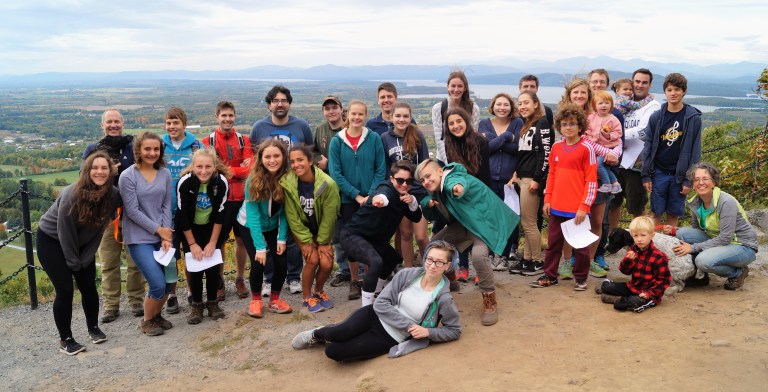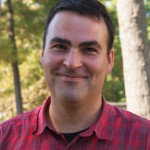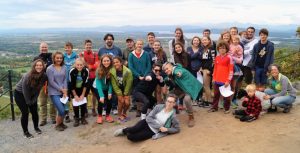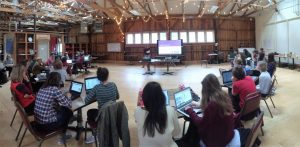Vermont What’s the Story? Update: November, 2016
0November 24, 2016 by Tom McKenna

 Editor’s note: This update on the Vermont What’s the Story? project is provided by Tim O’Leary (BLSE ’16), reposted from the project website at http://whatsthestoryvt.com.
Editor’s note: This update on the Vermont What’s the Story? project is provided by Tim O’Leary (BLSE ’16), reposted from the project website at http://whatsthestoryvt.com.
WTS Update: November 9th
We are two months into complex work, digging deep into critical thinking, communication, and collaboration in a hybrid (in person and online) environment, all with the prospects of creating positive social change. This year, our third, WTS is working with 30 learners, aged 12 to 18 and representing 10 secondary schools in Vermont, 11 adult instructional team members, and an additional 25 dedicated academics and social change agents participating in our blogging. At last count, there have been 257 meaning-making blog posts on issues of social concern, twice as many comments, and almost 8,000 visits to our site and narrative research, since mid-September.
Even with this data in mind, I’m resolved that it will never provide a complex picture into the soul of our work; we must deeply invest in narratives to understand our complex story, the social issues that these students are investigating, and the journeys of their learning.
From our kickoff day to our first overnight retreat on November 5-6, students used an “I-Search Blog” to write, reflect, and evolve their thinking in ways that were conversational and exploratory and written for discovery rather than to propose and pursue a thesis. Please explore those posts, here, especially the most recent ones, which reflect on the story of their learning at our retreat.
Mt. Philo Meditation
 On October 8th, and about halfway between the kickoff and our retreat, our WTS family met for a mid-day hike at Mt. Philo State Park in Charlotte, Vermont to converse about what matters most and explore pressing questions. This time together provided a wonderful balance of structure and freedom to build connections and progress our meaning-making through social learning.
On October 8th, and about halfway between the kickoff and our retreat, our WTS family met for a mid-day hike at Mt. Philo State Park in Charlotte, Vermont to converse about what matters most and explore pressing questions. This time together provided a wonderful balance of structure and freedom to build connections and progress our meaning-making through social learning.
Overnight Retreat
On November 5th-6th, we met in person for the third time, for our first overnight retreat at the picturesque Common Ground Center in Starksboro, Vermont. We will have two more there this year.
Learners gathered, ready to deliver their 5-minute pitch on an issue of social concern. I was remarkably impressed, seeing students reciting lines to themselves on their way in so that they wouldn’t forget specific points and making thoughtful, last-minute tweaks to slides. It was clear that this meant something to them. It was not about passing or getting a 78% or 96%. This was something much, much deeper than that. It was soulful. In these pitches, learners explained a topic of social concern, characters, stories, and ideas for change based on their thinking over the last six weeks. They sought buy-in from their peers to join them in a pursuit for social change. We began our pitches just before lunch.
Breaking for lunch, we were joined by Nadia Horning, Associate Professor of Political Science and Director of the Center for Creativity, Innovation, and Social Entrepreneurship at Middlebury College. She thoroughly engaged us about her own story: growing up in Madagascar, moving to France as a 12-year-old, and then traveling to the United States. She spoke passionately of her lo nging and determination to create what she considered real change for the people of Africa, a personal and professional path she has found in the last few years.
nging and determination to create what she considered real change for the people of Africa, a personal and professional path she has found in the last few years.
It just so happened to be Nadia’s 50th birthday. When I thanked her for coming, especially given that it was a big day for her, she said, “Really, this is the best thing I could possibly do on my birthday: talk to young people who listen this attentively and want to make social change. I couldn’t have asked for anything more on my birthday.”
Happy birthday Nadia, and thank you!
Before dinner, all the pitches were delivered. We feasted.
We met again at 6:30 and began a beautiful, collaborative discussion. There, 30 learners were led to connect and synthesize ideas, mesh personalities, passions, and insights and form Social Action Teams that would determine the issues, co-collaborators, and paths for the next seven months. Consensus seeking subgroups split off from the larger group. First, a number of young people interested in migrant workers in Vermont and cultural misunderstanding shuffled into the industrial kitchen attached to the meeting room in order to dig deeper, find connections, and forge collaborative teams. Another group focused around gender related issues, both identity and equity, moved to another side room. A third group focused on varying aspects of the environment remained, and one learner, dead-set on investigating innovative approaches to reform education, kept her ground. At the end of an hour: beginning together, caucusing, shifting from one caucus to another, splitting into subgroups – we had collectively reached consensus on eight social action teams to start our important work the very next morning. Those groups are loosely tied around the following ideas:
- Animal Cruelty, particularly on farms
- Building Better Cultural Communication in Schools
- Education Reform
- Gender Equity, with an acute focus to reform local school dress codes
- Gender Identity
- Lake Champlain Water Pollution: invasive species, fertilizer runoff and their correlation
- Mental Health, with a sub-focus on addiction
- Migrant Farm Workers, personal stories of risk and sacrifice
What’s the Story? has had this moment of consensus seeking, synthesis, and team consolidation as the pivotal moment in our work for the last two years. In addition, I’ve orchestrated a dozen similar conversations in other classes. However, there was something magical to this night; maturity, purposefulness, respect, advocacy for ideas and people, and empathy for others made this moment one I will not soon forget. A beautiful thing happened; I’m sure of that.
Card games ensued, guitars were played, and laughter and conversation from social change makers from across the state, who were as young as 12 and no older than 18, filled the common room that evening in the Eco-Lodge at the Common Ground.
After a well deserved sleep and breakfast the next morning, we took a moment to reflect on our collective journey, punctuated the day before. Then, for the first time, these Social Action Teams began the hard work of sustained collaboration: partnering with adult team members and working on developing an Action Plan for the next month.
That Sunday morning, the WTS Social Action Teams conceived shorter and longer term goals to dig deeper into the details of stories we are pursuing, the conflicts and differing perspectives at play, and the characters it would be wisest to contact and interview after our early December retreat. Additionally, the Action Plan pushed teams to develop synchronous and asynchronous ways to collaborate, using in person meetings and web-based tools.
The Action Plan is based around the following goals:
- Know your story deeper and back up claims with evidence,
- Identify stories that can personalize your social issue and make meaning of it in the life we know, and
- Schedule interviews with experts in the field: experts in content and in personal story.
At our December retreat, we will investigate how to conduct interviews and use the media kits to film and archive that work. Interviewing is a delicate art, a live performance that necessitates deep knowledge on a topic, interpersonal skills, nimbleness and awareness to dig in and find and follow stories, and technical and aesthetic know-how. They are blockbuster moments.
On Sunday afternoon as parents arrived, a mom was overheard asking her barely teenage son, “How was it?” The young person responded, “This was the best thing I’ve ever done!”
Other Quick Notes
- Middlebury Magazine just published a full eight page feature story, “Disruption in the Classroom,” on the good work we do. Please read it here. The author of the article, Doug Wilhelm, paints an engaging and inspiring story of our work by meticulously honoring the power of young people.
- What’s the Story? program has started this year with a sister project in Louisville, KY. Please see updates about their work.
- WTS presented and discussed our work at the Vermont Creative Learning Forum in Woodstock, VT. There are as many young people joining us as adults on our team!
- WTS also presented later that same week at the National Council of Teachers of English (NCTE) Conference in Atlanta, GA on Personalized and Proficiency-Based Education. Again, a student and her father joined our presentation team, putting her learning and story at the forefront of why we do what we do.
- Back in early October, WTS was profiled in print and online by Kids VT as one of “5 Tech Programs Opening Up New Worlds for Kids” in Vermont.
Category BLTN and Policy, BLTN Teachers, Fall 2016, Featured | Tags:
Leave a Reply